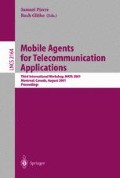Abstract
Over the last few years a large number of mobile agent systems have been developed, both in the academic field and in the industrial one. However, agent technology has hardly been adopted in developing commercial applications, notwithstanding its interesting potentialities. In our thinking, this has been mainly due to the lack of interoperability of agent technology with traditional and common techniques for developing distributed software, and to the fact that it has been often presented as the paradigm suitable for all distributed applications. Starting from this consideration, in this paper we present a model for integrating mobile agent technology into a common distributed object architecture such as CORBA. The implementation of the architecture has been carried out using our agent platform MAP, and the main strength of the adopted approach will be shown.
Access this chapter
Tax calculation will be finalised at checkout
Purchases are for personal use only
Preview
Unable to display preview. Download preview PDF.
References
A. Carzaniga, G.P. Picco, and G. Vigna. Designing Distributed Applications with Mobile Code Paradigms. In Proc. of 19th Int. Conf. on Software Engineering (ICSE’97), May 1997.
D.M. Chess, C.G. Harrison, and A. Kershenbaum. Mobile Agents: Are they a Good Idea? Technical Report RC19887, IBM T.J. Watson Research Center, March 1995.
FIPA www site. http://www.fipa.org/.
A. Fuggetta, G.P. Picco, and G. Vigna. Understanding Code Mobility. IEEE Transaction on Software Engineering, 24(5), May 1998.
R. Jain, F. Anjum, and A. Umar. A comparison of mobile agent and client-server paradigms for information retrieval tasks in virtual enterprises. In Proc. Academia/Industry Working Conference on Research Challenges (AIWORC) in Next Generation Enterprises: Virtual Organizations and Mobile/Pervasive Technologies, Buffalo, NY(USA), April 2000.
K. Rothermel and R. Popescu-Zeletin Eds.,. Mobile Agents. Lecture Notes in Comp. Science, LNCS1219, 1997.
D. Lange and M. Oshima. Seven good reasons for mobile agents. Communications of the ACM, 3(42): 88–89, March 1999.
MAP Home Page. http://sun195.iit.unict.it/MAP/.
P.J. Marques, P. Simoes, L.M. Silva, F. Boavida, and J.G. Silva. Mobile agent systems: From technology to applications. In OOPSLA2000 Wokshop on Experiences with Autonomous Mobile Objects and Agent Based System, Minneapolis, USA, October 2000.
H. De Meer, A. La Corte, A. Puliafito, and O. Tomarchio. Programmable Agents for Flexible QoS Management in IP Networks. IEEE Journal on Selected Areas in Communication, 18(2), February 2000.
D. Milojicic, M. Breugst, S. Covaci, and al. MASIF: the OMG Mobile Agent System Interoperability Facility. In Second International Workshop on Mobile Agents, (MA’98), Stuttgart (Germany), September 1998.
V. A. Phan and A. Karmouch. Mobile Software Agents: An Overview. IEEE Communication Magazine, 31(7):26–37, July 1998.
E. Di Pietro, A. La Corte, A. Puliafito, and O. Tomarchio. Extending the MASIF Location Service in the MAP Agent System. In IEEE Symposium on Computer Communications (ISCC2000), Antibes (France), July 2000.
A. Puliafito, S. Riccobene, and M. Scarpa. Which paradigm should I use?: An analytical comparison of the client-server, remote evaluation and mobile agent paradigms. Concurrency and Computation: Practice and Experience, 13:71–94, 2001.
A. Puliafito and O. Tomarchio. Security mechanisms for the MAP agent system. In 8th Euromicro Workshop on Parallel and Distributed Processing (PDP2000), Rhodos (Greece), January 2000.
A. Puliafito and O. Tomarchio. Using Mobile Agents to implement flexible Network Management strategies. Computer Communication Journal, 23(8):708–719, April 2000.
A. Puliafito, O. Tomarchio, and L. Vita. MAP: Design and Implementation of a Mobile Agents Platform. Journal of System Architecture, 46(2):145–162, January 2000.
R. Zahavi T.J. Mowbray. The essential CORBA: Systems Integration Using Distributed Objects. John Wiley & Sons, Inc., 1995.
Author information
Authors and Affiliations
Editor information
Editors and Affiliations
Rights and permissions
Copyright information
© 2001 Springer-Verlag Berlin Heidelberg
About this paper
Cite this paper
Puliafito, A., Tomarchio, O., Vita, L. (2001). Mobile Agents and Legacy Systems: How to Integrate Alternative Communication Paradigms. In: Pierre, S., Glitho, R. (eds) Mobile Agents for Telecommunication Applications. MATA 2001. Lecture Notes in Computer Science, vol 2164. Springer, Berlin, Heidelberg. https://doi.org/10.1007/3-540-44651-6_4
Download citation
DOI: https://doi.org/10.1007/3-540-44651-6_4
Published:
Publisher Name: Springer, Berlin, Heidelberg
Print ISBN: 978-3-540-42460-4
Online ISBN: 978-3-540-44651-4
eBook Packages: Springer Book Archive

